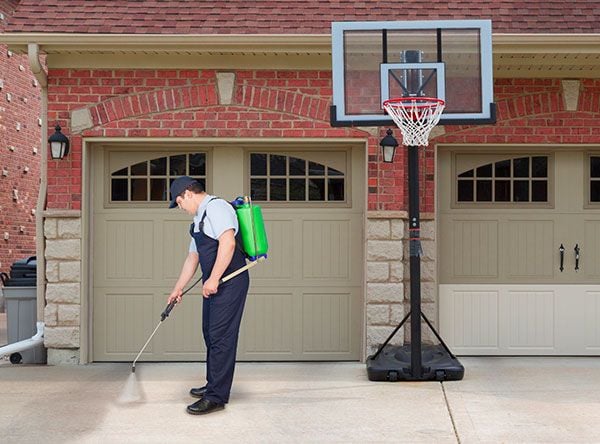
Choosing the right concrete sealer for your job depends on a number of factors.
Choosing the right concrete sealer for your job depends on a number of factors, but it primarily depends on the desired appearance and longevity of the application.
See below for a short description of the main types of sealant, then talk to your A-1 Concrete Leveling representative for a free evaluation and estimate to keep your concrete looking beautiful well into the future.

Acrylic Sealers for Concrete
Available in both solvent and water-based formulas, acrylic sealers are ideal for projects where easy application and low cost are important. On your concrete driveways, patios, and sidewalks these sealers create a protective film that provides good protection against oils, and salt penetration while causing water on the slabs to runoff. They are also UV resistant and non-yellowing. Available in a range of sheen levels, they also can be used to enhance the beauty of colored, stamped, or exposed-aggregate concrete.
-
How They Work
Acrylic sealers form a thin protective film on the concrete surface.
-
Primary Applications
Can be used for both exterior and interior concrete. Great for projects where easy application and cost factors are important. They enhance the beauty of colored, stamped, or exposed-aggregate concrete. Useful for faster application, since acrylics are often dry to the touch within an hour.
-
Type of Finish
Available in a range of sheen levels. Solvent-based acrylics generally enhance color better than water-based products.
-
Performance
Provide good protection against water and chloride intrusion, but usually wear faster than polyurethanes and epoxies. Solvent-based acrylics generally perform better than water-based products for outdoor use.
Penetrating Sealers (includes silanes, siloxanes, silicates, and siliconates)
Penetrating sealers, such as silanes, siloxanes, silicates, and siliconates, penetrate into the concrete to form a chemical barrier that shields against moisture penetration and deicing chemicals. Usually, they provide invisible protection without changing the surface appearance, and most products are breathable, allowing moisture vapor to escape. They are most commonly used outdoors since they provide excellent protection against harsh exposure conditions.
-
How They Work
Penetrate and react chemically within the capillaries of the concrete to shield against moisture penetration and deicing chemicals.
-
Primary Applications
Exterior concrete surfaces subject to corrosion and freeze-thaw damage Where a natural, matte finish is desired.
-
Type of Finish
Provide invisible protection without changing the surface appearance or leaving a sheen.
-
Performance
Provide excellent protection against outdoor exposure conditions. Most products are also breathable, allowing moisture vapor to escape.
Polyurethane Sealers
Polyurethane sealers are nearly twice as thick as an acrylic sealer and form a high-build protective film on the concrete surface that provides excellent resistance to abrasion and chemicals. They are available in water and solvent-based versions and a range of sheen levels. They can be used on both interior and exterior concrete to impart a transparent, non-yellowing, highly durable finish.
-
How They Work
Form a high-build protective film on the concrete surface. Available in both solvent and water-based formulations
-
Primary Applications
Both exterior and interior concrete in high-traffic areas, to provide good resistance to scuffs and staining To enhance the beauty of colored, stamped or exposed-aggregate concrete countertops
-
Type of Finish
Available in a range of sheen levels. Finish is transparent and non-yellowing.
-
Performance
Nearly twice as thick as acrylic sealers, and produce a very durable chemical- and abrasion-resistant finish. Most urethanes are moisture intolerant until they cure, so no water should be present on the surface when the sealer is applied.
DensiCrete
Densicrete is a penetrating sealer that reacts with the silica in the concrete, effectively forming new concrete bonds that fill tiny capillaries and cracks in the concrete. This process creates an effective water barrier by "densifying" the concrete thereby not allowing water to freely move through it.
During the application and chemical reaction phase, oils and salts are expelled from the concrete as the capillaries restrict. Densicrete is considered a one-and-done solution as it forms a permanent barrier to moisture in the top layer of concrete. Reapplication is not necessary unless a significant portion of the concrete's surface is worn away.
-
How it Works
As Densicrete is sprayed on the surface of the concrete, it is absorbed into the pores and capillaries of the top 1/2" or so of concrete. Then a chemical reaction occurs with the silicas in the concrete, which in effect creates new concrete to fill and densify the concrete. This pushes foreign material to the surface and creates a water-resistant seal against the elements and chemical de-icers.
-
Primary Applications
Outdoor applications, including driveways, sidewalks, and patios.
-
Type of Finish
Provides invisible protection without changing the surface appearance or leaving a sheen.
-
Performance
The longest-lasting sealer of the products listed. Instead of creating an artificial barrier on top of the concrete, it causes the concrete itself to become the barrier.
Which Sealer Is Right for Your Concrete?
Your concrete and the goals you have for it are unique, so there is no one-size-fits-all "best" concrete sealer to use. The most common sealer debate is between penetrating and topical sealers.
Penetrating sealers can be more cost-effective upfront and in the long term. Topical sealers give a special look that many homeowners love.
Check out our resource comparing these two types of concrete sealers side by side: Topical vs. Penetrating Sealer - Which Is Right for You?
With over thirty years in the marketing and design industry, Dale brings a wealth of experience to A-1. His expertise helps deliver a consistent message to our customers across the U.S. He helps A-1 franchisees with business development and efficiency, marketing strategies, advertising campaign development, and systems to better track ROI and customer satisfaction. He has a BFA in Graphic Design from the University of Akron.